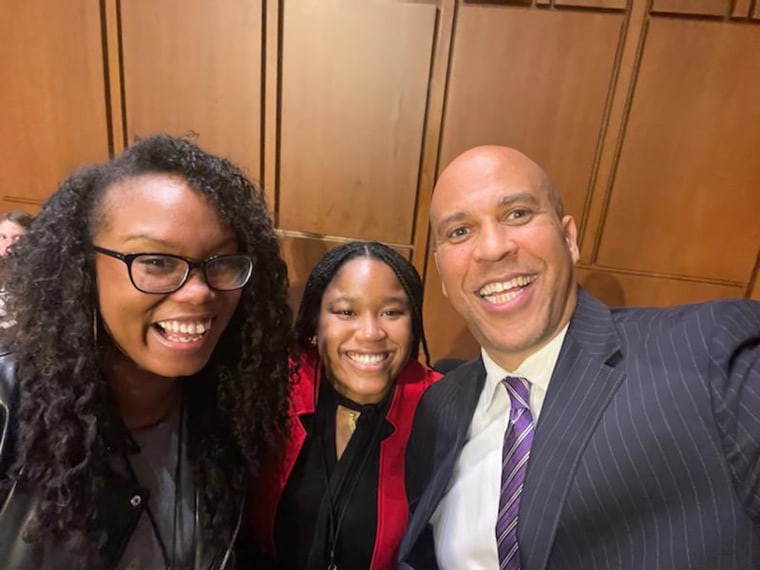After Jessica Fullilove, 31, a student at Northern Illinois University College of Law, attended the second day of hearings on the Supreme Court nomination of Judge Ketanji Brown Jackson, she couldn’t help but feel disillusioned about the process and the Republican senators whom she said had made a mockery of it.
“When you see someone who has worked their butt off, has pulled themselves up by their bootstraps, they’ve been the best of the best in everything, went to Harvard Law, went to Harvard for undergrad, clerked for a Supreme Court justice and graduated with honors, still have their accomplishments diminished, it does something to you,” Fullilove said.
“That hope that America is supposed to stand for, it dims that light,” she added.
The Senate confirmed Jackson to the Supreme Court on Thursday in a 53-47 vote, with only three Republicans supporting her. Fullilove and other Black Americans said in interviews that the behavior of Republican senators like Ted Cruz, Lindsey Graham and Josh Hawley during the confirmation process had put a bit of a damper on what should have been a celebratory occasion for all Americans.
Some Republican senators accused Jackson, the first Black woman confirmed to the court, of being soft on pedophiles and having a secret radical agenda, and that she would have defended Nazis at Nuremberg.
“I hate that a Black woman especially had to undergo this process and be faced with such vitriol and used kind of as a wall for the senators to bounce their midterm messaging off of,” said Simone Yhap, 24, a third-year student at Northeastern University School of Law, who also attended the second day of hearings.
Fullilove, Yhap and other members of the National Black Law Students Association traveled to Washington last month for the hearing. Fullilove said she was particularly moved when Sen. Cory Booker, D-N.J., the only Black senator on the 22-member Judiciary Committee, told Jackson on the third day of hearings that he knew the systemic barriers she had to overcome to ascend academically and professionally.
“You have earned this spot. You are worthy. You are a great American,” he told Jackson.
But it was something else Booker told Jackson — “I’m not letting anybody in the Senate steal my joy” — that Fullilove said she was carrying with her in this history-making moment.
“I am still going to celebrate the fact that there’s a woman like me, who looks like me, talks like me, probably uses some of the same hair products I use, sitting on the highest court of the land,” she said.

Jackson’s nomination, Fullilove said, has reminded her of the joy and pride she felt when Barack Obama was elected president and, 12 years later, Kamala Harris vice president.
“And now, I’m thinking about how I feel, as I’m watching another history-making appointment coming with Judge Ketanji Brown Jackson,” she said.
When Fullilove compares herself to family members who lived through the Jim Crow era, she said she feels grateful to have witnessed three racial ceilings broken in her lifetime.
Cornell Belcher, a Democratic pollster who worked for Obama, said the atmosphere at Jackson’s hearings was far different from the confirmation of Sandra Day O’Connor, the first female Supreme Court justice, in 1981.
“There was a sense of an important barrier being broken and some bipartisan warmth and celebration,” Belcher said of O’Connor, who was unanimously confirmed by the Senate, 99-0.
Some of the toughest questions O’Connor faced during her hearings came from fellow Republicans who didn’t believe she took a strong enough stance against abortion.
When you compare the treatment O’Connor received with how some Republican senators treated Jackson, the viciousness and racism is apparent, Belcher said.
“This barrier-breaking moment was met with disdain that this racial barrier is being broken,” said Belcher, an NBC News and MSNBC analyst. “That, to me, was striking but it also was very much in line with the in-your-face tribal politics of the Trump era.”
Even so, Jeryne Fish, 25, a student at New York University School of Law, plans to celebrate Jackson’s confirmation with her classmates and relish the moment with her colleagues in the National Black Law Students Association.
“Justices inevitably bring to their jobs their life experiences,” said Fish, who is the association’s national vice chair and chief operating officer. “Right now, when the justices sit down to deliberate on cases, my lived experience is not reflected at that table. As the court settles on decisions that will shape my life, my lived experience is left out of the room.”
That will change with the addition of Jackson, she said, but it hasn’t come without a cost.
“This isn’t anything new in spaces not built for us,” she said, referring to the attacks Jackson faced, including the false claims that she is soft on crime. “The cost of achieving diversity requires intentionality.”
Richard Garzola Jr., 26, national chair and chief executive officer of the National Black Law Students Association, attended one of Jackson’s hearings and closely watched the others. Some members of the association gathered in-person to watch as Jackson was confirmed, and some chapters scheduled parties on Zoom to attract a larger crowd of students from various cities, Garzola said.
Both Garzola and Fullilove said Jackson’s confirmation process serves as a reminder of something well known among Black people: They have to work twice as hard to go just as far as their white counterparts. And, they said, even then, their qualifications will still be questioned or undermined.
“I think Senator Booker and Sen. [Alex] Padilla said it best, that it is unfortunate that we have to pause such vile language and scrutiny to remind everyone that Judge Jackson is someone with an impeccable resume and near perfect track record,” said Garzola, a student at Georgetown Law.
Cliff Albright, a founder of the Black Voters Matter Fund, said he was confident Republican senators would use the hearings to “spread lies and propaganda” to try to weaken Jackson and get a reaction from her in the hopes that it would doom her nomination.
“The ugliness is not surprising, but it’s still disappointing,” Albright said. “So in that sense, it puts a damper on it.”
“But in a bigger sense, it can’t put a damper on it,” he added. “Because at the end of the day, she’s going to be Justice Ketanji Brown Jackson, the first Black woman to sit on the Supreme Court.”
Source: | This article originally belongs to Nbcnews.com











